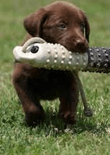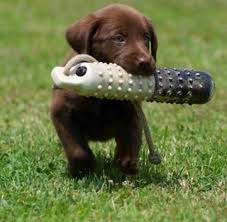10 Essential Puppy Training Tips
By Sally Gutteridge | Posts

 If you have just brought a new puppy home for the first time, it may be tempting to cuddle, spoil, and shower your adorable puppy with affection. But just as important as love and affection, is taking the time to train your puppy from a young age so that he can learn good behaviors that will stick with him for the rest of his life.
If you have just brought a new puppy home for the first time, it may be tempting to cuddle, spoil, and shower your adorable puppy with affection. But just as important as love and affection, is taking the time to train your puppy from a young age so that he can learn good behaviors that will stick with him for the rest of his life.
Early puppy training is one of the best ways to prevent long-term behavioral issues, like using the toilet indoors, barking, and chewing furniture. You can use the top puppy training tips below to help prepare yourself and your home ahead of time.
10 Essential Puppy Training Tips
Session expired
Please log in again. The login page will open in a new tab. After logging in you can close it and return to this page.